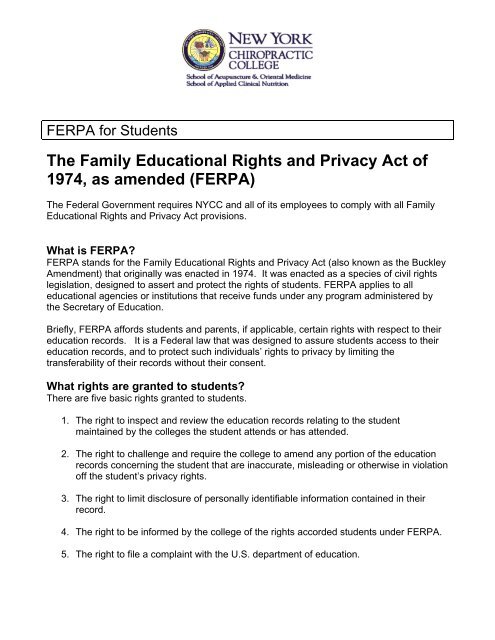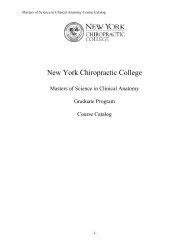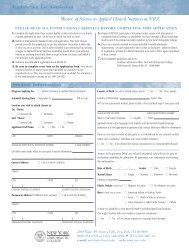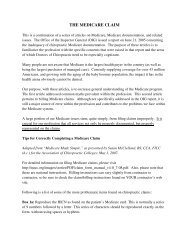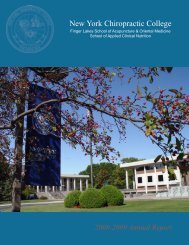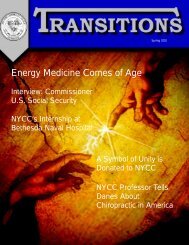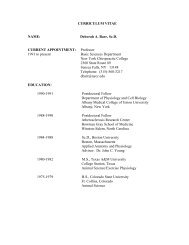FERPA Faculty and Staff Information
FERPA Faculty and Staff Information
FERPA Faculty and Staff Information
Create successful ePaper yourself
Turn your PDF publications into a flip-book with our unique Google optimized e-Paper software.
<strong>FERPA</strong> for Students<br />
The Family Educational Rights <strong>and</strong> Privacy Act of<br />
1974, as amended (<strong>FERPA</strong>)<br />
The Federal Government requires NYCC <strong>and</strong> all of its employees to comply with all Family<br />
Educational Rights <strong>and</strong> Privacy Act provisions.<br />
What is <strong>FERPA</strong>?<br />
<strong>FERPA</strong> st<strong>and</strong>s for the Family Educational Rights <strong>and</strong> Privacy Act (also known as the Buckley<br />
Amendment) that originally was enacted in 1974. It was enacted as a species of civil rights<br />
legislation, designed to assert <strong>and</strong> protect the rights of students. <strong>FERPA</strong> applies to all<br />
educational agencies or institutions that receive funds under any program administered by<br />
the Secretary of Education.<br />
Briefly, <strong>FERPA</strong> affords students <strong>and</strong> parents, if applicable, certain rights with respect to their<br />
education records. It is a Federal law that was designed to assure students access to their<br />
education records, <strong>and</strong> to protect such individuals’ rights to privacy by limiting the<br />
transferability of their records without their consent.<br />
What rights are granted to students?<br />
There are five basic rights granted to students.<br />
1. The right to inspect <strong>and</strong> review the education records relating to the student<br />
maintained by the colleges the student attends or has attended.<br />
2. The right to challenge <strong>and</strong> require the college to amend any portion of the education<br />
records concerning the student that are inaccurate, misleading or otherwise in violation<br />
off the student’s privacy rights.<br />
3. The right to limit disclosure of personally identifiable information contained in their<br />
record.<br />
4. The right to be informed by the college of the rights accorded students under <strong>FERPA</strong>.<br />
5. The right to file a complaint with the U.S. department of education.
What constitutes “education records”?<br />
Education records are those documents that, taken together, represent “an unabridged<br />
history of the student at the institution.” Examples of these records include, but are not<br />
limited to:<br />
• Admissions records<br />
• Cumulative academic records<br />
• Health records<br />
• Financial Aid records<br />
• Financial records<br />
• Progress records<br />
• Disciplinary records<br />
What type(s) of student information may be released?<br />
The only information that may be released without a student’s consent is called “directory<br />
information”. However, a student does have the right to restrict the release of this<br />
information as well.<br />
What does NYCC consider directory information?<br />
Currently, the College has identified the following items as Directory <strong>Information</strong>:<br />
1. Name, address, telephone number, e-mail address, photograph, dates of attendance,<br />
class.<br />
2. Previous institution(s) attended, major field of study, awards, honors (including Dean’s<br />
List), degree(s) conferred (including dates).<br />
3. Past <strong>and</strong> present participation in officially recognized activities, dates <strong>and</strong> place of birth.<br />
Students are afforded the right to prevent the disclosure of Directory <strong>Information</strong> in writing (3)<br />
three times a year, at registration.<br />
Can Education records be released without consent?<br />
Education record information may be disclosed without the student's written consent<br />
in the following instances:<br />
a) To the student.<br />
b) If it is "Directory <strong>Information</strong>" <strong>and</strong> the student has not restricted its release.<br />
c) If properly subpoenaed pursuant to a judicial, legislative, or administrative proceeding, in<br />
which case NYCC will make a reasonable attempt to notify the student of the subpoena, in<br />
cases where <strong>FERPA</strong> applies, prior to the release of the information, unless the subpoena<br />
specifically directs that the student is not to be notified.<br />
d) In connection with the student's application or receipt of financial aid as necessary to<br />
determine the eligibility, amount or conditions of the financial aid, or to enforce the terms or<br />
conditions of the aid.
e) In connection with audits or evaluation of federal or state supported educational programs<br />
requiring disclosure of information.<br />
f) To effect collection of past due financial obligations to the College.<br />
g) To authorized representatives of the Comptroller General of the United States, the<br />
Attorney General of the United States, the Secretary of the Department of Education, the<br />
U.S. Citizenship <strong>and</strong> Immigration Services bureau of the Department of Homel<strong>and</strong> Security<br />
(with respect to international students), or state or local educational authorities.<br />
h) To the Veterans Administration to determine compliance with educational assistance.<br />
i) In connection with a health or safety emergency as determined by the College<br />
j) To parents of financially-dependent students.<br />
Where do I go for questions on <strong>FERPA</strong>?<br />
Contact the Registrar’s Office at X3267


